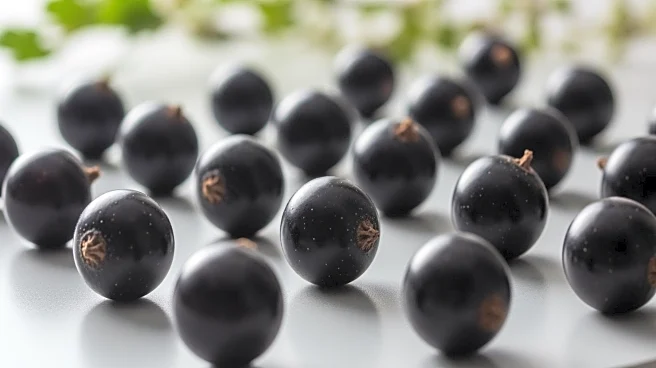What's Happening?
Researchers at James Hutton Scientific Services have secured funding for an additional five years to enhance blackcurrant varieties for the fresh fruit market. In collaboration with Winterwood Farms Ltd, the project aims to improve the taste, shelf life,
and harvestability of blackcurrants, making them more appealing for fresh consumption. Traditionally, blackcurrants are used in processing due to their high vitamin C content and other health benefits, but they are rarely available fresh in supermarkets. The research focuses on genetic improvements to produce blackcurrants with better flavor, larger size, and longer shelf life, while also enhancing resilience to climate change and reducing chemical input reliance.
Why It's Important?
This initiative could significantly impact the fruit industry by introducing blackcurrants as a fresh produce option, potentially increasing consumer choice and market diversity. The development of blackcurrants with improved traits could position them as a superfood, similar to raspberries and blueberries, thus expanding their market appeal. The project also addresses environmental concerns by breeding varieties that require fewer chemical inputs and are more adaptable to climate change. This aligns with the growing demand for sustainable agricultural practices and could lead to reduced pesticide use in fruit farming.
What's Next?
The ongoing collaboration with Winterwood Farms Ltd will involve trial plantings to ensure the new blackcurrant varieties meet commercial and consumer expectations. As the project progresses, the researchers aim to refine the genetic traits of blackcurrants further, potentially leading to their increased presence in the fresh fruit aisles. The success of this project could encourage similar initiatives in other fruit sectors, promoting innovation and sustainability in agriculture.
Beyond the Headlines
The project highlights the potential for genetic research to transform agricultural practices and consumer habits. By focusing on sustainability and resilience, the initiative could set a precedent for future agricultural research, emphasizing the importance of adapting crops to changing environmental conditions. This could lead to broader shifts in how fruits are cultivated and marketed, with long-term benefits for both producers and consumers.

















